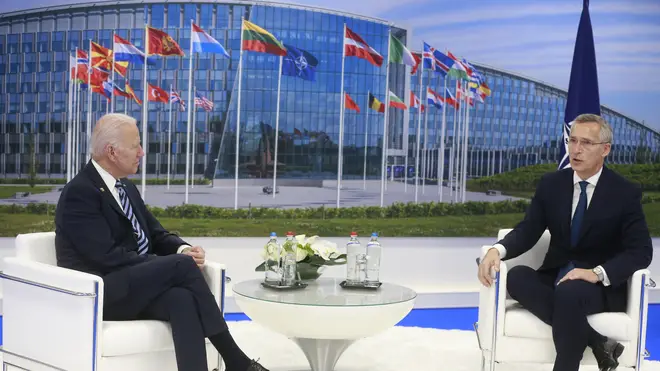
Shelagh Fogarty 1pm - 4pm
14 June 2021, 18:24

The warning comes as US President Joe Biden has stepped up his effort to rally allies to condemn more strongly China’s human rights record.
Nato leaders say China poses a constant security challenge, is trying to undermine world order and is working on nuclear missile development at a worrying pace.
In a summit statement, the leaders said that China’s goals and “assertive behaviour present systemic challenges to the rules-based international order and to areas relevant to alliance security”.
The warning to China comes as President Joe Biden has stepped up his effort to rally allies to speak in a more unified voice about China’s human rights record, its trade practices and its military’s increasingly assertive behaviour that has unnerved US allies in the Pacific.

While the 30 heads of state and government avoided calling China a rival, they expressed concern about what they said were its “coercive policies”, the opaque ways it is modernising its armed forces and its use of disinformation.
They called on Beijing to uphold its international commitments and to act responsibly in the international system.
Mr Biden, who arrived at the summit after three days of consulting with G7 allies in England, pushed for the G7 communique there that called out what it said were forced labour practices and other human rights violations affecting Uighur Muslims and other ethnic minorities in the western Xinjiang province.
The president said he was satisfied with the communique, although differences remain among the allies about how forcefully to criticise Beijing.
Mr Biden has used his eight-day trip to Europe to urge allies to work more closely in pressing Russian President Vladimir Putin over his government’s treatment of political dissidents and to do more to stem cyber attacks originating from Russia that have targeted private companies and governments around the globe.
The new Brussels communique states plainly that the Nato nations “will engage China with a view to defending the security interests of the alliance”.
We just concluded a successful #NATOSummit where we took far-reaching decisions for our security. Europe & North America are standing strong together in #NATO to defend our values & interests in an age of global competition. #NATO2030 https://t.co/iZW0TUgw9K pic.twitter.com/mh5sPmDqEL
— Jens Stoltenberg (@jensstoltenberg) June 14, 2021
But some allies bristled at the Nato effort to speak out on China.
German Chancellor Angela Merkel said Nato’s decision to name China as a threat “shouldn’t be overstated” because Beijing, like Russia, is also a partner in some areas. China is Germany’s top trading partner and is heavily dependent on Russia in fulfilling the country’s energy needs.
Mrs Merkel noted that “when you look at the cyber threats, the hybrid threats, when you look at the co-operation between Russia and China, you can’t just ignore China”.
But she added that it was important to “find the right balance” as China is also a partner on many issues.
Mrs Merkel said: “I think it’s very important, just like we do in Russia, to always make the offer of political discussions, political discourse, in order to come up with solutions. But where there are threats, and I said they’re in the hybrid field too, then as Nato you have to be prepared.”
The Chinese Embassy to the United Kingdom issued a statement saying the G7 communique “deliberately slandered China and arbitrarily interfered in China’s internal affairs” and exposed the “sinister intentions of a few countries, such as the United States”.